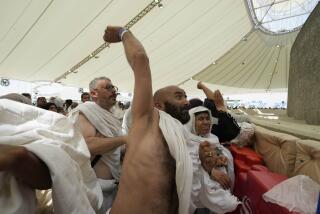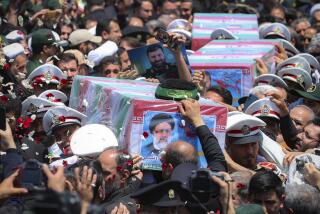At the Bomb Site, Anger Is Eclipsed by Disbelief
NAJAF, Iraq â âLong live Saddam Hussein!â
A young man blurted out the slogan Saturday just outside the walls of a Shiite Muslim shrine, beside the crater of a car bomb that killed one of the faithâs most respected clerics and massacred scores more as they left Friday prayers.
Loyalists of the deposed Hussein regime are widely suspected in the bombing, making the pronouncement all the more provocative.
The young sloganeer headed down the street, but enraged mourners soon collared him and turned him over to police.
It was an edgy and tense morning Saturday outside the tomb of Imam Ali, the 7th century caliph venerated by Shiites. Utter disbelief seemed to overwhelm palpable anger and outrage. âNajaf is a city of culture, of religion, of poetry, of science,â said Wathir Kinani, 48, whose ice cream shop directly across from the bomb site was heavily damaged. âWe are not used to this kind of thing. We are peaceful people.â
Yet Kinani said he was grateful for one thing: The bomb had spared his sons, who were dispensing ice cream when the explosion shook the shop. Neither was injured.
Over and over, people wondered how such a ferocious attack could take place after the ouster of Hussein, the Shiitesâ longtime persecutor.
âEven during the time of Saddam we would not expect such an outrage as this,â Kinani said. âHow can we comprehend such a thing?â Some assumed that the young man who shouted was deranged. But others noted a troubling trend of Hussein nostalgia -- even here, in a place ruthlessly suppressed by Hussein during the uprising that followed the 1991 Persian Gulf War.
âNo one here wants Saddam back -- he is hated here -- but it must be said that Najaf was secure in his time,â said a tailor who, like many, had come to the shrine to see what was going on Saturday. âEveryone knows there are agents here, provocateurs, men of violence. The potential is here. We need security.â
Others nodded in qualified agreement but were nonetheless quick to add that they preferred a nation without the strongman. âSaddam was our enemy,â said Karim Jasmin, 40, a blacksmith.
One man told a story, perhaps apocryphal, of how tribal elders from Iraqâs Sunni Muslim heartland -- Husseinâs major source of support -- had recently visited their counterparts near Najaf. They urged their Shiite countrymen to join them in taking up arms against the U.S. âinvaders.â
The Shiitesâ reply? âAs soon as we are finished collecting the bones of our sons,â a reference to the many killed by the Hussein regime and dumped in mass graves.
As the morning progressed, throngs gathered on the streets outside the gold-domed shrine. Funeral processions filed past for some of the dead, en route to the nearby cemetery that people here say is the largest in the world and the place every Shiite aspires to be buried.
Everywhere were likenesses of black-turbaned Mohammed Bakr Hakim -- a popular ayatollah targeted and killed in the blast. Most people seemed to expect Hakimâs funeral to take place, but the event was put off. The powerful explosion left little of his corpse, authorities said.
As the crowds swelled, a yellow crane, bulldozer and flatbed truck made their way through the multitudes. The crane managed to hoist the remains of half a dozen charred, bomb-damaged vehicles from the site and load their carcasses onto the flatbed. Not a safety helmet was in sight as the crane swung the vehicles over the swelling crowd before dropping them onto the flatbed, narrowly avoiding power lines.
But peopleâs attention never seemed to stray long from Fridayâs attack. While mourners pronounced loyalists of Hussein the principal suspects, they also named other potential plotters: foreign terrorists, shadowy Western interests, Sunni Muslim fanatics. Unmentioned was one group -- rival Shiite factions -- that outsiders say could be responsible. Power struggles among the Shiites, Iraqâs majority, are frequent, though they are mostly waged below the surface.
âThis could not have been done by a fellow Shiite,â insisted Hani Abdul-Zahra, 29. âImpossible. Never in a holy place like this.â
Talk of the bombing inevitably evolved into a kind of sounding board for complaints about post-invasion Iraq. The gripes are many, albeit familiar: poor security, inadequate water supply, spotty electrical service, few job prospects.
President Bush âpromised so much,â Abdul-Zahra said. âWhere are all the promises? Why arenât our lives getting better?â
On a day to point fingers, many found another culprit: the media. Iraqis complained that the Arab-language networks, such as Al Jazeera, were anti-Shiite and pro-Hussein. And the Western media, many said, were tools of U.S. and Israeli interests.
At one point, an incensed group of about two dozen trapped four Western journalists inside a badly damaged hotel. But a turbaned cleric stood at the door and would not let the group in.
âThink of the image you are giving the world of our people,â the cleric said, chastising the chanting crowd. âWe appear backward, uncivilized. Iraqis are not this way.â
Eventually, the group dispersed, and the journalists left.
Rallies, denunciations and marches continued the rest of the day outside the shrine, as the distraught people of Najaf mourned the loss of their brothers and sisters and searched for someone to blame.
More to Read
Sign up for Essential California
The most important California stories and recommendations in your inbox every morning.
You may occasionally receive promotional content from the Los Angeles Times.










